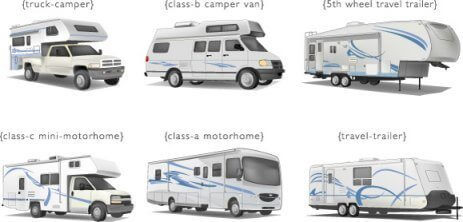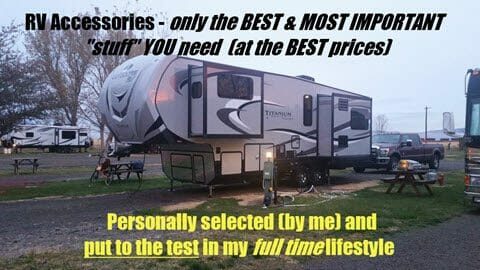Choosing the right type of RV – How to buy an RV (Part 3 of a series)
Note: This is part 3 of a 5 part series, originally created in late 2016, now being updated in Nov. 2020. Some of the narrative is new, NOT the videos. The first post in this series has an important comment at the beginning worth reading as well.
When it comes to buying a camper…
You’ve got choices! Towable (fifth wheel, travel trailer, popup) or Motorized (Class A, Class C, Class B) Which is best for you? Consider the options – start with my video below…
Summary points to Choosing the Right RV for YOUR needs…
- Begin your journey by evaluating HOW and WHEN you plan to use your RV – winter? National Forest? full time? weekends only? with kids?
- Fifth wheel trailers typically offer the most living area and storage space for a reasonable cost.
- Fifth wheel trailers often require a 3/4 ton diesel truck (or more) to pull them
- Since my original posting of this guide, I have prepared a post that is specific for those considering a 5th wheel trailer – many of the comments in that post can also be applied to travel trailer purchasers. My fifth wheel buying guide is HERE.
- Motorhomes offer greater convenience while traveling – passengers can sleep, eat, use facilities while in motion – but the vehicle you tow may not be as functional as the truck that tows a trailer.
- Class B motorhomes offer compromises – mobility and small size in return for beds and dining tables that often must be broken down/set up for use.
- There are now some EXCELLENT Class B+ and Super C campers being produced that should be considered. Some of the best are made by small companies NOT affiliated with the two giant corporate conglomerates.
- Class A motorhomes are effectively a “bus on wheels”, Class C motorhomes use the “overhead cab” style design, with large Chevy or Dodge cabs for the motorized portion, Class B’s are more like vans.
- Mercedes updated their HIGHLY ACCLAIMED Sprinter 3500 chassis in 2019, so the 2020 and newer models have this NEW and innovative chassis.
- If you tow with a Class A or C, you’re going to pay insurance on two motorized vehicles
- When your motorhomes motor/drivetrain needs service, your home is going in for service as well!
- Many (most?!) manufacturers make a sub-standard camper – know who the “good guys” are BEFORE you plunk down your hard-earned money.
- The purchase is NOT finalized until you sign the final paperwork and drive/tow it off the dealers lot. UNTIL that moment, you’re in charge. After that moment, there’s typically NO buyers remorse clause for RV’s.
As Marlon pointed out in Part 2 of this series, buying used (especially at the right price) will enable you to learn what you really like and then replace that “rig” with something more ideal with your next purchase.
In the market for a camper? Want a guide by your side who has your back?
***Considering a Camper Purchase? Help is here! Check out our
Concierge RV Camper Buying (and Selling) Service
save money, avoid aggravation AND time.***
Missed parts 1 and 2? Start HERE.
Part 4 – Where to buy a RV and What to look for is now posted! Click HERE
While you’re here, please do visit our home page for RV Across America – there are 9 “tiles” on our home page that lead to posts on a variety of topics, along with companies I support like Passport America, Boondockers Welcome and others!
Feel free to leave feedback in the space below
Want regular updates as I create new posts? Join me here…


Thanks for going over different types of RVs. It’s good to know that class C motorhomes have a more “van style” to them. It sounds like you should identify your needs first before deciding on what RV you should purchase.
Most definitely. Good luck in your sales Taylor. Al